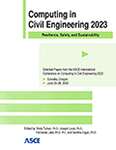Optimizing HVAC Systems for Energy Efficiency and Comfort: A Scalable and Robust Multi-Zone Control Approach with Uncertainty Considerations
Publication: Computing in Civil Engineering 2023
ABSTRACT
Commercial buildings often face challenges in coordinating heating, ventilation, and air conditioning (HVAC) systems due to varying occupant preferences, resulting in thermal discomfort and energy waste. Balancing comfort and efficiency requires understanding comfort profiles and energy consumption at different temperatures while accounting for uncertain disturbances like outdoor temperatures and extra heat. Furthermore, control algorithms (e.g., model predictive control) are typically computationally expensive, limiting large-scale building applications. To address these challenges, this paper presents a robust HVAC control framework ensuring occupant comfort and energy efficiency despite external disturbances. By solving an optimization problem, the approach determines temperature setpoints that minimize energy usage while maintaining desired comfort probability. Specifically, a probabilistic certificate guarantees long-term comfort under disturbances, and a myopic method enhances computational efficiency. Tested in a 98-room real-world building, the proposed method effectively ensures comfort and energy efficiency, surpassing the baseline model.
Get full access to this article
View all available purchase options and get full access to this chapter.
REFERENCES
Afram, A., and F. Janabi-Sharifi. (2014). “Theory and Applications of HVAC Control Systems – A Review of Model Predictive Control (MPC).” Build Environ, 72: 343–355. https://doi.org/10.1016/J.BUILDENV.2013.11.016.
Aryal, A., and B. Becerik-Gerber. (2020). “Thermal Comfort Modeling When Personalized Comfort Systems are in Use: Comparison of Sensing and Learning Methods.” Build Environ, 185: 107316. https://doi.org/10.1016/J.BUILDENV.2020.107316.
Bueno, B., L. Norford, G. Pigeon, and R. Britter. (2012). “A Resistance-Capacitance Network Model for the Analysis of The Interactions Between the Energy Performance of Buildings and the Urban Climate.” Build Environ, 54: 116–125. https://doi.org/10.1016/J.BUILDENV.2012.01.023.
Daum, D., F. Haldi, and N. Morel. (2011). “A Personalized Measure of Thermal Comfort for Building Controls.” Build Environ, 46 (1): 3–11. https://doi.org/10.1016/J.BUILDENV.2010.06.011.
Farina, M., L. Giulioni, and R. Scattolini. (2016). “Stochastic Linear Model Predictive Control with Chance Constraints – A review.” J Process Control, 44: 53–67. https://doi.org/10.1016/J.JPROCONT.2016.03.005.
Ghahramani, A., F. Jazizadeh, and B. Becerik-Gerber. (2014). “A Knowledge Based Approach for Selecting Energy-aware and Comfort-driven HVAC Temperature Set Points.” Energy Build, 85: 536–548. https://doi.org/10.1016/j.enbuild.2014.09.055.
Gholamzadehmir, M., C. Del Pero, S. Buffa, R. Fedrizzi, and N. Aste. (2020). “Adaptive-Predictive Control Strategy for HVAC Systems in Smart Buildings – A Review.” Sustain Cities Soc, 63: 102480. https://doi.org/10.1016/J.SCS.2020.102480.
Hatanaka, T., T. Ikawa, and N. Li. (2020). “A Passivity-Based Design of Cyber-Physical Building HVAC Energy Management Integrating Optimization and Physical Dynamics.” Economically Enabled Energy Management: Interplay Between Control Engineering and Economics, 309–341. https://doi.org/10.1007/978-981-15-3576-5_12/FIGURES/19.
Hewing, L., K. P. Wabersich, M. Menner, and M. N. Zeilinger. (2020). “Learning-Based Model Predictive Control: Toward Safe Learning in Control.” Annu Rev Control Robot Auton Syst, 3: 269–296. https://doi.org/10.1146/ANNUREV-CONTROL-090419-075625.
Jung, W., and F. Jazizadeh. (2020). “Energy Saving Potentials of Integrating Personal Thermal Comfort Models for Control of Building Systems: Comprehensive Quantification through Combinatorial Consideration of Influential Parameters.” Appl Energy, 268: 114882. https://doi.org/10.1016/J.APENERGY.2020.114882.
Karmann, C., S. Schiavon, and E. Arens. (2018). “Percentage of Commercial Buildings Showing at least 80% Occupant Satisfied with Their Thermal Comfort.” Proceedings of 10th Windsor Conference: Rethinking Comfort.
Liang, W., R. Xiong, P. Liu, P. Tang, and E. Cochran. (2022). “Improving Post-occupancy Evaluation Engagement using Social Robots.” BuildSys 2022 - Proceedings of the 2022 9th ACM International Conference on Systems for Energy-Efficient Buildings, Cities, and Transportation, 159–167. https://doi.org/10.1145/3563357.3564071.
Sturzenegger, D., D. Gyalistras, V. Semeraro, M. Morari, and R. S. Smith. (2014). “BRCM MATLAB Toolbox: Model Generation for Model Predictive Building Control.” Proceedings of the American Control Conference, 1063–1069. https://doi.org/10.1109/ACC.2014.6858967.
US Department of Energy. (2012). 2011 Buildings Energy Data Book.
Wang, Z., H. Jing, C. Kurniawan, A. Chern, and Y. Nakahira. (2022). “Myopically Verifiable Probabilistic Certificate for Long-term Safety.” Proceedings of the American Control Conference, 2022-June: 4894–4900. https://doi.org/10.23919/ACC53348.2022.9867675.
Information & Authors
Information
Published In
History
Published online: Jan 25, 2024
ASCE Technical Topics:
- Architectural engineering
- Building systems
- Buildings
- Energy consumption
- Energy efficiency
- Energy engineering
- Energy infrastructure
- Energy sources (by type)
- Engineering fundamentals
- HVAC
- Infrastructure
- Lifeline systems
- Mathematics
- Measurement (by type)
- Probability
- Renewable energy
- Structural engineering
- Structures (by type)
- Temperature effects
- Temperature measurement
- Thermal power
Authors
Metrics & Citations
Metrics
Citations
Download citation
If you have the appropriate software installed, you can download article citation data to the citation manager of your choice. Simply select your manager software from the list below and click Download.
